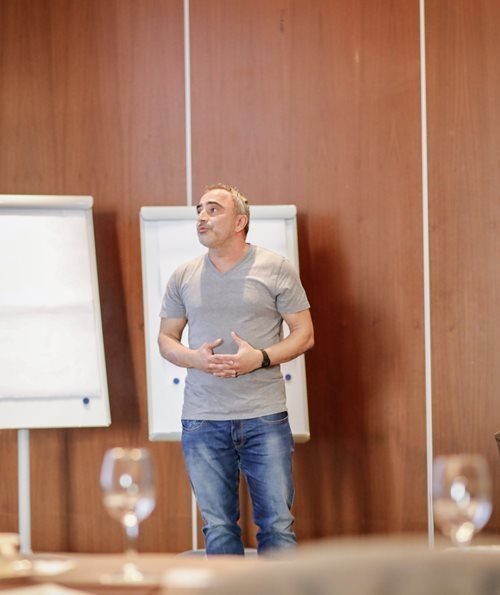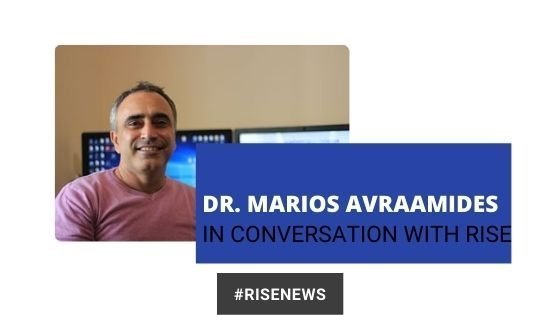He has previously obtained a BA in Psychology from the University of Texas at Austin and an MSc and a PhD degree in Cognitive/Experimental Psychology from the Pennsylvania State University. Prior to returning to Cyprus, he has worked as a postdoctoral scientist at the University of California Santa Barbara (USA) and at the Max-Planck-Institute for Biological Cybernetics (Germany). His research interests lie within the field of spatial cognition and include among others spatial memory, navigation, and perspective-taking.
His research has been funded by multiple research grants, including a prestigious starting grant from the European Research Council (ERC). He has participated in various international panels, including the ISCH domain of the European COST framework and the SH4 panel of the ERC competition.
In his interview he talked about his current research, as well as how the COVID-19 pandemic affected his work, and gave us a chance to get to know him a little better!
· What is it about your field of research that motivates you the most?
Ever since I can remember, I have been fascinated by the workings of the human mind. I just find it so astonishing that a machine such as the brain is capable of making us experience so many different things at any given point in time, ranging from remembering with fondness episodes from our childhood to feeling attracted towards others. For this reason, I’ve been drawn towards the study of human cognition. In other words, I’ve been studying what gives rise to the way we think. For many years my research has focused on memory, and more so, on spatial memory. That is, I’ve been studying how people encode, maintain, and use information in memory about the environment. This is the information we use when we find our way in an unfamiliar city or when we try to find a shortcut to a destination. Knowing how the human mind and brain process spatial information can have important practical applications. For example, it can be used to improve city planning or to build more efficient navigation devices for the blind.
· What makes the current research group you are leading special for you?
My research on spatial cognition at the University of Cyprus has used a variety of technologies, including immersive Virtual Reality for advance visualization and interaction with realistic simulated environments and psychophysiology/electrophysiology for collecting behavioral and neural data. At RISE, I have been using these and other methods to study topics that related to Cognition and Neuroscience, but which go beyond spatial cognition. More importantly, the Cognitive and Clinical Applications research group that I have established at RISE, has been focusing on topics that can have more direct impact to society and can more easily lead to commercial products. For example, one of our current funded projects (TONE) focuses on developing and testing a Mixed Reality application that can help musicians overcome acute and chronic pain by improving their postures while playing their instrument. Using different sensors, this app collects in real time data about the posture and muscle activity of the musician and provides feedback to the musician to adjust her playing habits. Another ongoing project in which my group is involved, focuses on developing Virtual and Augmented Reality tasks that can be used, as part of a larger effort that includes several academic and industry partners, to create and sustain a local market for Astrotourism. Overall, I’m excited by the fact that at RISE I can work on projects whose aim is to develop solutions for real-world problems. Through RISE, I also got a chance to collaborate with scientists with very diverse backgrounds and expertise. This has led me to exciting new projects — such as the two described above — that I never thought I could be interested in (or have useful things to contribute to). So now, I can tell you how to properly sit when you play the violin and that the stars of the Summer Triangle are called Vega, Altair, and Daneb. But I’m afraid the sharing of this newfound knowledge had made me even more annoying to hang out with, No?

Marios Avraamides is a Professor of Cognitive Psychology at the University of Cyprus where he teaches courses on Cognitive and Experimental Psychology, Memory, Attention, and Perception. Here at RISE, he is the Pillar Leader of Human Factors and Design and the Group leader of the Cognitive and Clinical Applications multidisciplinary research group. .
He has previously obtained a BA in Psychology from the University of Texas at Austin and an MSc and a PhD degree in Cognitive/Experimental Psychology from the Pennsylvania State University. Prior to returning to Cyprus, he has worked as a postdoctoral scientist at the University of California Santa Barbara (USA) and at the Max-Planck-Institute for Biological Cybernetics (Germany). His research interests lie within the field of spatial cognition and include among others spatial memory, navigation, and perspective-taking.
His research has been funded by multiple research grants, including a prestigious starting grant from the European Research Council (ERC). He has participated in various international panels, including the ISCH domain of the European COST framework and the SH4 panel of the ERC competition.
In his interview he talked about his current research, as well as how the COVID-19 pandemic affected his work, and gave us a chance to get to know him a little better!
Great to speak to you, Marie! First, we’d love to hear more about your work at RISE…
· What is it about your field of research that motivates you the most?
Ever since I can remember, I have been fascinated by the workings of the human mind. I just find it so astonishing that a machine such as the brain is capable of making us experience so many different things at any given point in time, ranging from remembering with fondness episodes from our childhood to feeling attracted towards others. For this reason, I’ve been drawn towards the study of human cognition. In other words, I’ve been studying what gives rise to the way we think. For many years my research has focused on memory, and more so, on spatial memory. That is, I’ve been studying how people encode, maintain, and use information in memory about the environment. This is the information we use when we find our way in an unfamiliar city or when we try to find a shortcut to a destination. Knowing how the human mind and brain process spatial information can have important practical applications. For example, it can be used to improve city planning or to build more efficient navigation devices for the blind.
· What makes the current research group you are leading special for you?
My research on spatial cognition at the University of Cyprus has used a variety of technologies, including immersive Virtual Reality for advance visualization and interaction with realistic simulated environments and psychophysiology/electrophysiology for collecting behavioral and neural data. At RISE, I have been using these and other methods to study topics that related to Cognition and Neuroscience, but which go beyond spatial cognition. More importantly, the Cognitive and Clinical Applications research group that I have established at RISE, has been focusing on topics that can have more direct impact to society and can more easily lead to commercial products. For example, one of our current funded projects (TONE) focuses on developing and testing a Mixed Reality application that can help musicians overcome acute and chronic pain by improving their postures while playing their instrument. Using different sensors, this app collects in real time data about the posture and muscle activity of the musician and provides feedback to the musician to adjust her playing habits. Another ongoing project in which my group is involved, focuses on developing Virtual and Augmented Reality tasks that can be used, as part of a larger effort that includes several academic and industry partners, to create and sustain a local market for Astrotourism. Overall, I’m excited by the fact that at RISE I can work on projects whose aim is to develop solutions for real-world problems. Through RISE, I also got a chance to collaborate with scientists with very diverse backgrounds and expertise. This has led me to exciting new projects — such as the two described above — that I never thought I could be interested in (or have useful things to contribute to). So now, I can tell you how to properly sit when you play the violin and that the stars of the Summer Triangle are called Vega, Altair, and Daneb. But I’m afraid the sharing of this newfound knowledge had made me even more annoying to hang out with, No?

